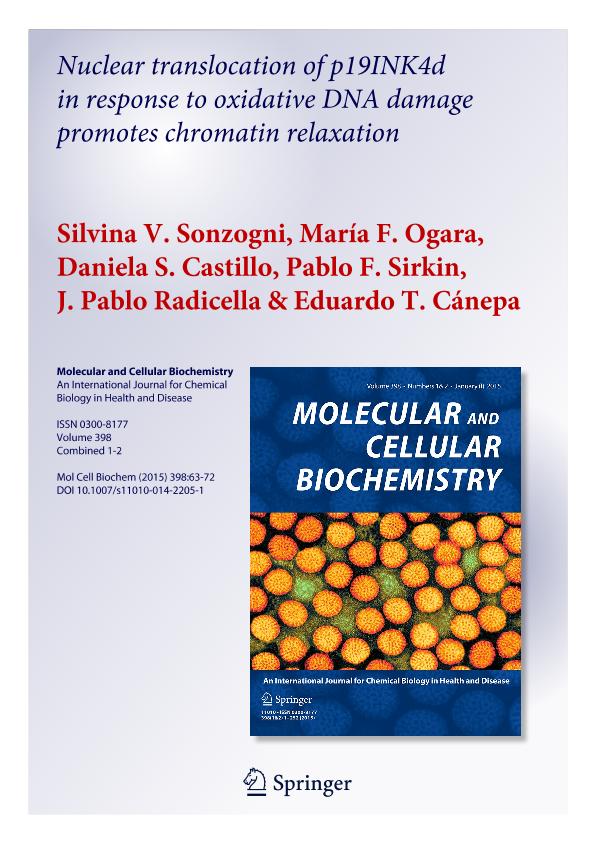Artículo
Nuclear translocation of p19INK4d in response to oxidative DNA damage promotes chromatin relaxation
Sonzogni, Silvina Veronica ; Ogara, Maria Florencia
; Ogara, Maria Florencia ; Castillo, Daniela Susana
; Castillo, Daniela Susana ; Sirkin, Pablo Federico
; Sirkin, Pablo Federico ; Radicella, J. Pablo; Canepa, Eduardo Tomas
; Radicella, J. Pablo; Canepa, Eduardo Tomas
 ; Ogara, Maria Florencia
; Ogara, Maria Florencia ; Castillo, Daniela Susana
; Castillo, Daniela Susana ; Sirkin, Pablo Federico
; Sirkin, Pablo Federico ; Radicella, J. Pablo; Canepa, Eduardo Tomas
; Radicella, J. Pablo; Canepa, Eduardo Tomas
Fecha de publicación:
09/2014
Editorial:
Springer
Revista:
Molecular and Cellular Biochemistry
ISSN:
0300-8177
e-ISSN:
1573-4919
Idioma:
Inglés
Tipo de recurso:
Artículo publicado
Clasificación temática:
Resumen
DNA is continuously exposed to damaging agents that can lead to changes in the genetic information with adverse consequences. Nonetheless, eukaryotic cells have mechanisms such as the DNA damage response (DDR) to prevent genomic instability. The DNA of eukaryotic cells is packaged into nucleosomes, which fold the genome into highly condensed chromatin, but relatively little is known about the role of chromatin accessibility in DNA repair. p19INK4d, a cyclin-dependent kinase inhibitor, plays an important role in cell cycle regulation and cellular DDR. Extensive data indicate that p19INK4d is a critical factor in the maintenance of genomic integrity and cell survival. p19INK4d is upregulated by various genotoxics, improving the repair efficiency for a variety of DNA lesions. The evidence of p19INK4d translocation into the nucleus and its low sequence specificity in its interaction with DNA prompted us to hypothesize that p19INK4d plays a role at an early stage of cellular DDR. In the present study, we demonstrate that upon oxidative DNA damage, p19INK4d strongly binds to and relaxes chromatin. Furthermore, in vitro accessibility assays show that DNA is more accessible to a restriction enzyme when a chromatinized plasmid is incubated in the presence of a protein extract with high levels of p19INK4d. Nuclear protein extracts from cells overexpressing p19INK4d are better able to repair a chromatinized and damaged plasmid. These observations support the notion that p19INK4d would act as a chromatin accessibility factor that allows the access of the repair machinery to the DNA damage site.
Palabras clave:
Dna Damage Response
,
Chromatin Relaxation
,
P19ink4d
,
Genome Integrity
Archivos asociados
Licencia
Identificadores
Colecciones
Articulos(IFIBYNE)
Articulos de INST.DE FISIOL., BIOL.MOLECULAR Y NEUROCIENCIAS
Articulos de INST.DE FISIOL., BIOL.MOLECULAR Y NEUROCIENCIAS
Articulos(IQUIBICEN)
Articulos de INSTITUTO DE QUIMICA BIOLOGICA DE LA FACULTAD DE CS. EXACTAS Y NATURALES
Articulos de INSTITUTO DE QUIMICA BIOLOGICA DE LA FACULTAD DE CS. EXACTAS Y NATURALES
Articulos(OCA CIUDAD UNIVERSITARIA)
Articulos de OFICINA DE COORDINACION ADMINISTRATIVA CIUDAD UNIVERSITARIA
Articulos de OFICINA DE COORDINACION ADMINISTRATIVA CIUDAD UNIVERSITARIA
Citación
Sonzogni, Silvina Veronica; Ogara, Maria Florencia; Castillo, Daniela Susana; Sirkin, Pablo Federico; Radicella, J. Pablo; et al.; Nuclear translocation of p19INK4d in response to oxidative DNA damage promotes chromatin relaxation; Springer; Molecular and Cellular Biochemistry; 398; 1-2; 9-2014; 63-72
Compartir
Altmétricas



